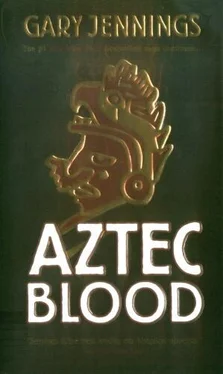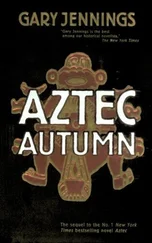Gary Jennings - Aztec Blood
Здесь есть возможность читать онлайн «Gary Jennings - Aztec Blood» весь текст электронной книги совершенно бесплатно (целиком полную версию без сокращений). В некоторых случаях можно слушать аудио, скачать через торрент в формате fb2 и присутствует краткое содержание. Жанр: Старинная литература, на английском языке. Описание произведения, (предисловие) а так же отзывы посетителей доступны на портале библиотеки ЛибКат.
- Название:Aztec Blood
- Автор:
- Жанр:
- Год:неизвестен
- ISBN:нет данных
- Рейтинг книги:4 / 5. Голосов: 1
-
Избранное:Добавить в избранное
- Отзывы:
-
Ваша оценка:
- 80
- 1
- 2
- 3
- 4
- 5
Aztec Blood: краткое содержание, описание и аннотация
Предлагаем к чтению аннотацию, описание, краткое содержание или предисловие (зависит от того, что написал сам автор книги «Aztec Blood»). Если вы не нашли необходимую информацию о книге — напишите в комментариях, мы постараемся отыскать её.
Aztec Blood — читать онлайн бесплатно полную книгу (весь текст) целиком
Ниже представлен текст книги, разбитый по страницам. Система сохранения места последней прочитанной страницы, позволяет с удобством читать онлайн бесплатно книгу «Aztec Blood», без необходимости каждый раз заново искать на чём Вы остановились. Поставьте закладку, и сможете в любой момент перейти на страницу, на которой закончили чтение.
Интервал:
Закладка:
"I can't blame him," the fray said.
Then he turned and looked at me. His hands were shaking, his face sweating. I was ready to give up, too, but he threw back a cup of pulque, then poured one for me.
"Cristóbal, you have to help or the woman will die."
He only called me by my proper name when he needed something urgent.
"The saw has to be steady, the cut even."
He gave me two small pieces of wood. "Hold these straight. I will pass the saw through them as I cut."
I had assisted in medical procedures before, but I had never seen a limb cut off. I held the two pieces of wood just above the knee, and the saw ripped through the woman's flesh. Her blood covered us both. When the fray hit her femur, it sounded as if he was tearing through a log. She passed out in shock, and at last her wailing ceased. When the leg was amputated, the fray removed the severed limb and dropped it on the floor at my feet. The fray quickly tightened the tourniquet and began to cauterize the severed veins with the red-hot knife.
After searing the stump with seething oil, he covered the convulsively unconscious woman with a blanket, saying to me, "Clean up."
He staggered out the door, no doubt to dull his mind with more pulque. I stared at the ashen-faced, comatose woman—and at the bloody piece of leg. What was I supposed to do with it?
FIFTEEN
At the House of the Poor I crept across the main room without lighting a candle. Rather than sleep in the big room, I went into the fray's enclosed corner and lay down on his bed. I lay there for over an hour, unable to sleep, when I heard men entering the house. No voices. They were trying to be quiet, but the straw gave them away.
Neither Fray Antonio nor our rope-sandaled street people had come in, men wearing boots had entered. I heard the jingle of spurs. A third man had entered, a wearer of spurs. That did not inevitably mean the man was a gachupin. Indio, mestizo, and africano vaqueros wore spurs as well, but they favored working rowels of honed iron. These were the silver spurs of a caballero.
The old woman had sent a gachupin and two helpers for me.
¡Así es! So be it.
The fray's rabbit hole was almost filled with blankets. I quickly removed enough to make room for me and slipped in, pulling the trapdoor and its rug over my head. The trapdoor would not completely close, but unless one was looking for it, it was unlikely they would spot it.
Through a crack in the opening, I saw someone enter with a lit torch. A Spaniard, about forty years old. From his clothes, it was obvious that he was a caballero, a gentleman and swordsman.
"No one here," he said. His voice was aristocratic, with that tone of cold command. Here was a man used to issuing orders.
"No sign of the boy or the priest in the main room, Don Ramon."
The second voice was that of an indio or mestizo vaquero, a horseman who drove cattle and sheep, perhaps even an overseer who commanded the hacienda's workers.
"They must all be at the festival, Don Ramon," he said.
"No way they can be found in that crowd," the don answered, "and anyway I have to get back to the reception. We will return in the morning."
A guest at the alcalde's reception itself. Truly a very big wearer of spurs.
I waited in the rabbit's hole until long after the crunch of boots had faded from the house. Climbing out of the hole, I crawled over to the blanket curtain and peeked into the darkness of the main room. Nothing moved. Still the fear that someone had stayed behind to watch kept me from going through the door. Instead I opened the wicker shutter that covered the window opening behind the fray's bed and climbed out into the alley. From the position of the moon, I estimated I had been in the rabbit hole for a good two hours and had been home from the festival for more than three.
I crept down the alley until I was two blocks from the House of the Poor, then positioned myself where I could watch the street leading to its front door. I was certain the fray would make his way home along this street.
I sat down with my back to a wall staring up the alley. Soon people came streaming back from the festival, many of them raucously inebriated.
Near dawn Fray Antonio and a rowdy group of neighbors staggered down the street. I rushed out and took the fray aside.
"Cristo, Cristo, what's the matter? Have you seen a ghost? You look like Montezuma upon learning that the Plumed Serpent, Quetzalcóatl, had claimed his throne."
"Fray, there is great trouble." I told him about the woman in black and the man named Don Ramon, who had searched the House of the Poor.
The fray crossed himself. "We are lost."
His panic fueled mine. "What are you talking about, Fray. Why do these people wish me harm?"
"Ramon is the devil himself." He grabbed my shoulders, and his voice shook. "You must flee the city."
"I—I can't leave. This is the only place I know."
"You must leave now, this moment."
Fray Antonio pulled me into the darkness of the narrow alley. "I knew they would come someday. I knew that the secret could not stay buried forever, but I did not think you would be found this quickly."
I was young and scared and ready to cry. "What have I done?"
"That does not matter. All that counts now is flight. You must leave the city by the Jalapa road. A steady stream of pack trains is hauling goods from the treasure fleet to the fair. There will be horsemen as well. You will not be noticed among the other travelers."
I was horrified. Go to Jalapa by myself? It was several days' journey. "What will I do in Jalapa?"
"Wait for me. I will come. Many people from the city go there for the fair. I will take Fray Juan with me. You stay near the fair until I arrive."
"But, Fray, I don't—"
"Listen to me!" He grabbed my shoulders again, his fingernails dug into them. "There is no other path. If they find you, they will kill you."
"Why—"
"I can't give you answers. If anything is to save you, it might be your very ignorance. From this moment on, do not speak Spanish. Speak only Náhuatl. They are looking for a mestizo. Never admit that you are one. You are indio. Give yourself an indio name, not a Spanish one."
"Fray—"
"Go—now! Vayas con Dios. And let God be your protector because no man will lift a hand to help a mestizo."
SIXTEEN
I left the city before dawn, walking quickly, sticking to the shadows. There were already a few travelers on the road, mule and donkey trains loaded with goods from the ships. I had not been far down the Jalapa road in years and what lay ahead for me was the unknown. While I was capable of taking care of myself on the streets of Veracruz, that was the only life I now knew. My confusion and dismay was aggravated by fear of the unknown and unfamiliar.
The Jalapa road trailed southwest out of the city, then cut across the sand dunes, swamps, and inlets before it slowly rose up the side of the great mountain range. Once the hot sands and swamps were passed, the trail ascended into the mountains. The heat of the tierra caliente slowly cooled.
Jalapa was a village high enough for travelers to escape the miasma that rose up from the swamps and annually killed one-fifth of Veracruz. Still the village's chief function was as a resting place on the road from Veracruz to the City of Mexico—except, of course, when the treasure fleet's fair was held.
I did not find carriages and wagons traveling all the way to Jalapa, though some would journey part of the way. The mountain roads would not accommodate them. People traveled by horse, mule, or Shank's mare. Or, in the case of the very wealthy, by litter-covered chairs suspended on two long poles. In the city a litter was commonly carried by servants, but over the mountains the poles were harnessed to mules.
Читать дальшеИнтервал:
Закладка:
Похожие книги на «Aztec Blood»
Представляем Вашему вниманию похожие книги на «Aztec Blood» списком для выбора. Мы отобрали схожую по названию и смыслу литературу в надежде предоставить читателям больше вариантов отыскать новые, интересные, ещё непрочитанные произведения.
Обсуждение, отзывы о книге «Aztec Blood» и просто собственные мнения читателей. Оставьте ваши комментарии, напишите, что Вы думаете о произведении, его смысле или главных героях. Укажите что конкретно понравилось, а что нет, и почему Вы так считаете.











